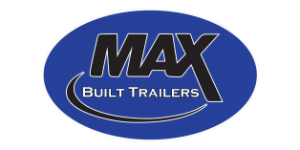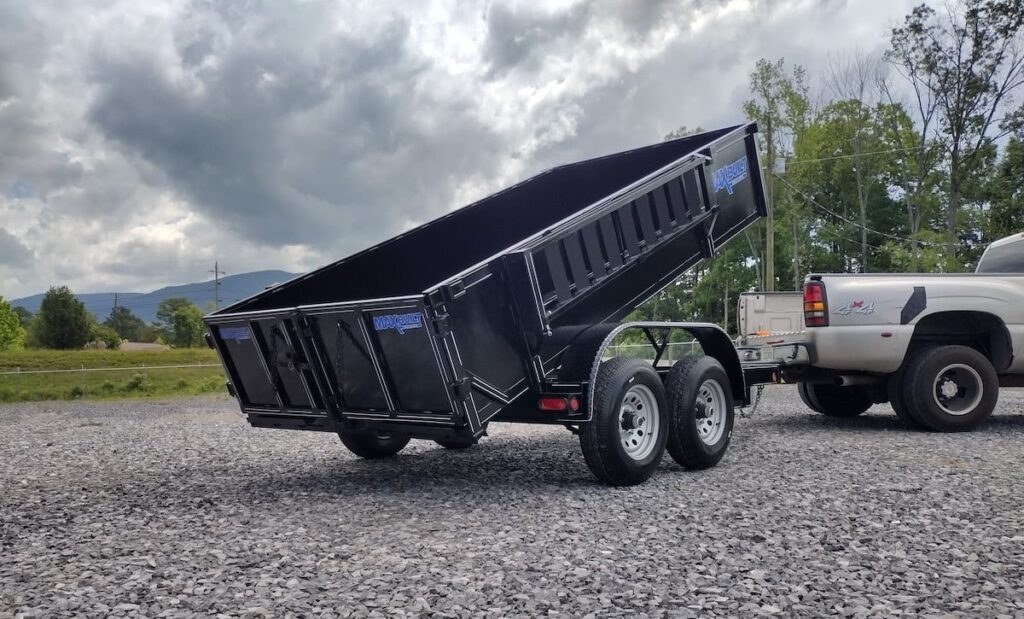To start off, ALL of our trailers are heavy duty. But if you’re moving real heavy equipment, we’ve put together this guide to our toughest models.
Heavy-duty trailers play a crucial role in various industries, from construction and agriculture to transportation and logistics. These trailers are designed to withstand heavy loads and tough conditions, making them essential for businesses and individuals requiring reliable hauling solutions. In this comprehensive guide, we’ll explore everything you should know about heavy-duty trailers, from their types and features to maintenance tips and purchasing considerations.
What features must a trailer have to be considered “Heavy Duty”?
- Strong and Durable Construction: Heavy-duty trailers are typically constructed with high-strength materials such as steel or aluminum to withstand heavy loads and rugged terrain. The frame, deck and other structural components should be sturdy and durable.
- High Payload Capacity: A heavy-duty trailer should have a high payload capacity to safely transport heavy loads. This capacity is determined by factors such as the trailer’s design, construction and axle configuration.
- Multiple Axles: Heavy-duty trailers often feature multiple axles to distribute the weight of the load evenly and provide stability during transportation. The number and configuration of axles depend on the trailer’s size, weight capacity and intended use.
- Heavy-Duty Suspension System: A robust suspension system is essential to absorb shocks and vibrations and provide a smooth ride—even when hauling heavy loads over rough terrain. The suspension should be designed to handle the trailer’s weight capacity and provide adequate support.
- Advanced Braking System: An advanced braking system—such as electric, hydraulic or air brakes—is necessary to ensure safe and reliable stopping power, particularly when hauling heavy loads or traveling downhill. The braking system should be properly sized and maintained to meet safety standards.
- Reinforced Decking: The deck surface of a heavy-duty trailer should be reinforced to withstand the weight and impact of heavy cargo. Depending on the trailer’s intended use, decking materials may include wood, steel or aluminum—with additional reinforcements as needed.
- Ramps and Loading Equipment: Heavy-duty trailers may come equipped with built-in ramps or loading equipment such as cranes or winches to facilitate easy loading and unloading of cargo. These features should be sturdy and capable of supporting the weight of the load.
- Tie-Down Points: Secure tie-down points or anchor systems are essential for safely securing cargo to the trailer to prevent shifting or movement during transport. These tie-down points should be strategically located and capable of withstanding the forces exerted by the cargo.
- Durability and Reliability: A heavy-duty trailer should be built to withstand frequent use and harsh operating conditions, providing long-term durability and reliability for the owner. Quality construction, components and craftsmanship contribute to the trailer’s overall durability and performance.
- Compliance with Regulations: Heavy-duty trailers should meet regulatory standards and requirements for safety, dimensions and load capacity in the regions where they will be operated. Compliance with these regulations ensures legal operation and promotes safety on the road.
Types of Heavy-Duty Trailers:
- Flatbed Trailers: Flatbed trailers feature a flat, open deck, making them versatile for transporting oversized or irregularly shaped cargo. They are commonly used in the construction, manufacturing and transportation industries. Flatbed trailers can often handle loads ranging from 10,000 pounds (4,535 kilograms) to over 40,000 pounds (18,144 kilograms), depending on their size and construction.
- Deckover Trailers: Deckover trailers have a low deck height, allowing them to transport tall or oversized equipment such as bulldozers, excavators and other heavy machinery. They can handle loads ranging from 40,000 pounds (18,144 kilograms) to over 100,000 pounds (45,359 kilograms) or more depending on their axle configuration and deck size.
- Dump Trailers: Dump trailers are equipped with hydraulic systems that allow them to tilt and unload cargo. They are commonly used in construction and landscaping for transporting materials like gravel, sand and debris. Dump trailers vary in size and capacity, but they can typically handle loads ranging from 5,000 pounds (2,268 kilograms) to over 20,000 pounds (9,072 kilograms), depending on their size and hydraulic system.
- Enclosed Trailers: Enclosed trailers provide protection from the elements and security for valuable cargo. They are often used for transporting equipment, tools, goods that require shelter from weather or theft, horses, livestock, cars and motorcycles. They can typically handle loads ranging from 5,000 pounds (2,268 kilograms) to over 20,000 pounds (9,072 kilograms), depending on their size and construction.
- Gooseneck Trailers: Gooseneck trailers feature a forward extension that extends over the towing vehicle’s rear axle, providing greater stability and weight distribution. They are often used for heavy hauling applications such as transporting livestock, equipment or vehicles. They can handle loads ranging from 10,000 pounds (4,535 kilograms) to over 30,000 pounds (13,608 kilograms), depending on their size and construction.
- Equipment trailers: Equipment trailers are specifically designed to transport heavy equipment such as tractors, skid steers, landscaping and lawn equipment and utility vehicles. They feature ramps, tie-down points and heavy-duty construction to securely haul various types of machinery.
- Car Hauler/Car Trailer: Car hauler trailers, also known as car carrier trailers or auto transport trailers, are designed to transport automobiles, including cars, trucks and SUVs. They typically feature ramps, tie-downs and specialized configurations to safely secure and transport vehicles. A heavy-duty car hauler trailer should be built to withstand frequent use and harsh operating conditions, providing long-term durability and reliability for the owner. The car hauler trailer should be equipped with sturdy ramps or loading equipment to facilitate easy loading and unloading of vehicles. These ramps should be capable of supporting the weight of the vehicles and securely locking in place during transit.
It’s important to note that these are general estimates, and the actual weight capacity of a heavy-duty trailer will depend on various factors including its design, construction and intended use. Additionally, it’s crucial to adhere to local regulations and safety guidelines when determining the appropriate weight for a trailer and its load.
Maintenance Tips for Heavy-Duty Trailers:
- Regular Inspections: Perform routine inspections of the trailer’s tires, brakes, lights and suspension components to identify any signs of wear or damage.
- Greasing and Lubrication: Keep all moving parts properly lubricated to reduce friction and wear, including wheel bearings, hinges and hydraulic components.
- Tire Maintenance: Check tire pressure regularly and inspect tires for signs of wear, cracks or punctures. Replace worn or damaged tires promptly to ensure safe operation.
- Cleaning and Rust Prevention: Wash the trailer regularly to remove dirt, debris and corrosive materials that can contribute to rust and corrosion. Apply rust-resistant coatings as needed to protect exposed metal surfaces.
- Storage and Protection: Store the trailer in a dry, sheltered location when not in use to protect it from the elements and minimize exposure to moisture and rust.
Purchasing Considerations:
- Payload Capacity: Consider the maximum weight capacity of the trailer to ensure it can safely transport your intended cargo.
- Size and Dimensions: Choose a trailer size and configuration that suits your hauling needs and can accommodate the size and shape of your cargo.
- Quality and Durability: Invest in a high-quality trailer from a reputable manufacturer known for producing durable and reliable products.
- Customization Options: Look for trailers that offer customization options to meet your specific requirements, such as additional features or modifications for specialized applications.
- Warranty and Support: Consider the warranty coverage and after-sales support offered by the manufacturer or dealer to ensure peace of mind and assistance in case of any issues or concerns.
In conclusion, heavy-duty trailers are indispensable tools for businesses and individuals requiring robust hauling solutions. By understanding their types, features, maintenance requirements and purchasing considerations, you can make informed decisions to select the right trailer for your needs and ensure reliable performance for years to come.
Our expert sales staff are able to recommend the ideal heavy duty trailer for your intended purpose. Just give us a call or stop by one of our locations in North Carolina, Tennessee or Georgia.
Legal Disclaimer: The information provided in this article is for general guidance purposes only. It is not intended as legal, safety, professional advice, or replacement for product manuals. Readers are advised to consult relevant authorities, manufacturers’ guidelines, and seek professional assistance for their specific circumstances and vehicles. The author and publisher disclaim any liability for actions taken based on the contents of this article.






